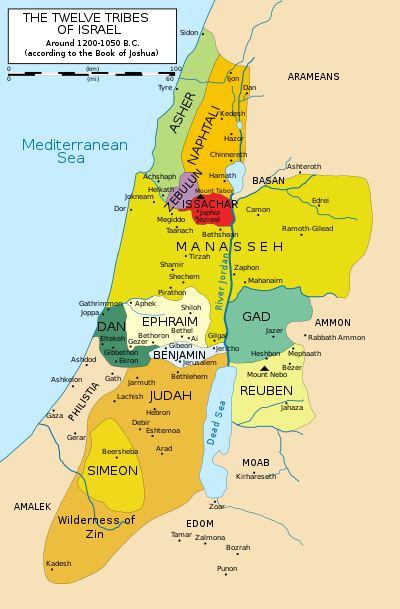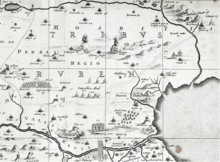Tribe of Reuben
According to the Hebrew Bible, the Tribe of Reuben (Hebrew: שֵׁבֶט רְאוּבֵן, Modern: Shevet Re'uven, Tiberian: Šḗḇeṭ Rəʼûḇēn) was one of the twelve tribes of Israel. Unlike the majority of the tribes, the land of Reuben, along with that of Gad and half of Manasseh, was on the eastern side of the Jordan and shared a border with Moab. According to the biblical narrative, the Tribe of Reuben descended from Reuben, the oldest son of the patriarch Jacob. Reuben, along with nine other tribes, is reckoned by the Bible as part of the northern kingdom of Israel, and disappears from history with the demise of that kingdom in c. 723 BC.
| Tribes of Israel |
|---|
 |
| The Tribes |
| Related topics |
|


Tribal territory
The Book of Joshua records that the tribes of Reuben, Gad and half of Manasseh were allocated land by Moses on the eastern side of the Jordan River and the Dead Sea (Joshua 13:15-23). The Tribe of Reuben was allocated the territory immediately east of the Dead Sea, reaching from the Arnon river in the south, and as far north as the Dead Sea stretched, with an eastern border vaguely defined by the land dissolving into desert; the territory included the plain of Madaba.
The exact border between Reuben and the Tribe of Gad, generally considered to have been situated to the north of Reuben, is somewhat inconsistently specified in the Bible, with Dibon and Aroer being part of Gad according to Numbers 32:34, but part of Reuben according to Joshua 13:15-16. On that basis, the Jewish Encyclopedia (1906) claimed that the territory of Reuben was an enclave in the territory of Gad.[2]
The territories described in Joshua 13 depict Gad as being to the north of Reuben, while the description in Numbers 32 and 34 has Reubenites living near Heshbon, surrounded by Gadites.[3] Yohanan Aharoni interpreted the description in Numbers as referring to the actual distribution of Reubenites and Gadites around the time of David, and the description in Joshua 13 as reflecting administrative districts set up in the time of Solomon, but not reflecting actual tribal settlement patterns.[3] By 900 BC, some of the territory and Reuben and Gad had been captured by the Moabite kingdom.[3]
Biblical narrative
Origins
According to the Torah, the tribe consisted of descendants of Reuben, the first son of Jacob, and a son of Leah, from whom it took its name. Modern scholarship views the events described in Genesis and Exodus, which contain the early stories about Jacob and his immediate descendants, as non-historical.[4][5][6]
The Bible divides the tribe of Reuben into four clans or families, the Hanochites, Palluites, Hezronites, and Carmites, which according to the Bible were descended from Reuben's sons Hanoch, Pallu, Hazron, and Carmi.[7]
Genesis 49 contains the Blessing of Jacob, a series of predictions which the Bible presents as delivered by the patriarch Jacob about the future fate of the tribes descended from his twelve sons. Some textual scholars date it substantially later than these events.[8] Reuben is characterised as fickle, "unstable as water", and condemned to no longer "have . . . the excellency" due to Reuben's crime of having sexual relations with his father's wife Bilhah.[9]
The Bible relates that Jacob and his twelve sons, along with their sons, went down into Egypt as a group of about seventy persons, including Reuben and his four sons.[10] According to the account in Exodus, the Israelites stayed in Egypt for 430 years, and their numbers grew to include about 600,000 men, not counting women or children.[11] At this point they left Egypt (see The Exodus) and wandered for forty years in the wilderness between Egypt and the promised land of Canaan.[12]
As the tribes prepared to enter Canaan by crossing over to the west side of the Jordan, the Book of Numbers records that the Israelites defeated Sihon and Og, kings east of the Jordan.[13] The tribes of Reuben and Gad requested that they be given land in the territory east of Jordan, because it was suitable for their needs as livestock grazers. In exchange for their promise to help with the conquest of the land west of the Jordan, Moses accepted their request and granted to them and half of Manasseh land east of the Jordan.[14] Following the death of Moses, Joshua became the leader of the Israelites,[15] and with the help of these eastern tribes including Reuben,[16] conquered some of Canaan and assigned the land of Israel to the various twelve tribes.[17]
According to Kenneth Kitchen, this conquest occurred around 1200 BC,[18] but "almost all" scholars have abandoned the idea that Joshua carried out a conquest of Canaan similar to that described in the Book of Joshua.[19] Israel Finkelstein et al., have claimed that lack of evidence for a systematic conquest or the abrupt appearance of a new culture indicates that the Israelites simply arose as a subculture within Canaanite society.[20] The territory of Reuben encapsulated the territory of the earlier kingdom of Sihon.
Tribal history
From after the conquest of the land under Joshua until the formation of the first Kingdom of Israel, the Tribe of Reuben was a part of a loose confederation of Israelite tribes. No central government existed, and in times of crisis the people were led by ad hoc leaders known as Judges (see the Book of Judges). In this period, according to the ancient Song of Deborah, Reuben declined to take part in the war against Sisera, the people instead idly resting among their flocks as if it were a time of peace, though the decision to do so was taken with a heavy heart.[21]
With the growth of the threat from Philistine incursions, the Israelite tribes decided to form a strong centralised monarchy to meet the challenge, and the Tribe of Reuben joined the new kingdom with Saul as the first king. After the death of Saul, all the tribes other than Judah remained loyal to the House of Saul, but after the death of Ish-bosheth, Saul's son and successor to the throne of Israel, the Tribe of Reuben joined the other northern Israelite tribes in making David, who was then the king of Judah, king of a re-united Kingdom of Israel.
According to the Book of Chronicles, Adina and thirty Reubenites aided David as members of his mighty warriors in conquering the City of David.[22] Also according to Chronicles, during the reign of King Saul Reuben instigated a war with the Hagarites, and was victorious;[23] in another portion of the same text, Reuben is said to have been assisted in this war by Gad and the eastern half of Manasseh.[24]
Upon the accession of Rehoboam, David's grandson, in c. 930 BC the northern tribes split from the House of David to reform a Kingdom of Israel as the Northern Kingdom. Reuben was a member of the kingdom until the kingdom was conquered by Assyria. According to 1 Chronicles 5:26, Tiglath-Pileser III of Assyria (ruled 745-727 BC) deported the Reubenites, Gadites, and the half-tribe of Manasseh to "Halah, Habor, Hara, and the Gozan River."
Banner
The Tribes of Israel had banners described by the Book of Numbers, such the Lion of Judah.[25][26] Jewish writers have diverged on whether the banner of Reuben bore the symbol of a man or male child (Aben Ezrah), a mandrake, or a child holding a mandrake in his hand.[27]
See also
References

- Ann E. Killebrew (October 2005). Biblical Peoples and Ethnicity: An Archaeological Study of Egyptians, Canaanites, Philistines, and Early Israel, 1300–1100 B.C.E. Society of Biblical Lit. p. 152. ISBN 978-1-58983-097-4.
- "Reuben, Tribe of." Jewish Encyclopedia (1906)
- Yohanan Aharoni (1 January 1979). The Land of the Bible: A Historical Geography. Westminster John Knox Press. p. 89. ISBN 978-0-664-24266-4.
- Craig A. Evans; Joel N. Lohr; David L. Petersen (20 March 2012). The Book of Genesis: Composition, Reception, and Interpretation. BRILL. p. 64. ISBN 90-04-22653-2.
- Lester L. Grabbe (23 February 2017). Ancient Israel: What Do We Know and How Do We Know It?: Revised Edition. Bloomsbury Publishing. pp. 31–34. ISBN 978-0-567-67044-1.
- John Van Seters (3 October 2014). Changing Perspectives 1: Studies in the History, Literature and Religion of Biblical Israel. Routledge. pp. 2–5. ISBN 978-1-317-54393-0.
- Numbers 26:5. See also Genesis 46:9, Exodus 6:14, and 1 Chronicles 5:1-3.
- Richard Elliott Friedman, Who Wrote the Bible? (Harper San Francisco) (1987) ISBN 0-06-063035-3
- Genesis 49:4
- Genesis 46:1-27
- Exodus 12:37-40 in the Masoretic Text. The Septuagint counts the 430 years as including not only the time in Egypt but also some previous time in the land of Canaan.
- Numbers 32:13
- Numbers 21
- Numbers 32
- Joshua 1
- Joshua 4:12-13
- This conquest and allotment of land is the subject of the whole book of Joshua, but see especially chapters 6, 8-12 for some conquest narratives, 13-21 on the allocation of land.
- Kitchen, Kenneth A. (2003), On the Reliability of the Old Testament (Grand Rapids, Michigan. William B. Eerdmans Publishing Company)(ISBN 0-8028-4960-1)
- Lester L. Grabbe (1 January 2000). "Writing Israel's History at the End of the Twentieth Century". International Organization for the Study of the Old Testament: Congress Volume Oslo 1998. Supplements to Vetus testamentum. BRILL. p. 210. ISBN 90-04-11598-6. Retrieved 15 January 2017.
- Israel Finkelstein, The Bible Unearthed
- Judges 5:15-16
- 1 Chronicles 11:42
- 1 Chronicles 5:10
- 1 Chronicles 5:18+
- Numbers 2:2
- "Tribal identity: the meaning of the Jewish flag".
- Thomas Fuller (1869). A Pisgah sight of Palestine. p. 75.
External links
- Map of the tribal territory of the Tribe of Reuben, Adrichem, 1590, Eran Laor Cartographic Collection, the National Library of Israel
- Map of the tribal territory of the Tribe of Reuben, Fuller, 1650 Eran Laor Cartographic Collection, the National Library of Israel